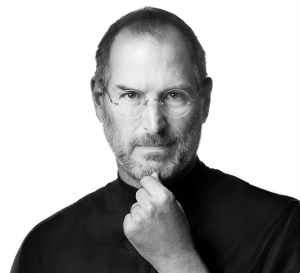 A team of researchers from UW CSE, the UW Center for Communication & Civic Engagement, and Seattle CityClub has launched an improved and expanded version of the Living Voters Guide for the November 2011 election in Washington State. Its purpose is to bring together Washington voters to discuss and explore their positions on both statewide and local ballot measures for 2011. Unlike traditional voters’ guides issued by governments, advocacy groups, and other organizations, it is co-created solely by its participants. It will evolve continuously throughout the election season as Washingtonians from across the state consider the tradeoffs for each measure.
A team of researchers from UW CSE, the UW Center for Communication & Civic Engagement, and Seattle CityClub has launched an improved and expanded version of the Living Voters Guide for the November 2011 election in Washington State. Its purpose is to bring together Washington voters to discuss and explore their positions on both statewide and local ballot measures for 2011. Unlike traditional voters’ guides issued by governments, advocacy groups, and other organizations, it is co-created solely by its participants. It will evolve continuously throughout the election season as Washingtonians from across the state consider the tradeoffs for each measure.
The Living Voters Guide is part of an NSF-sponsored project to investigate socio-computational systems to support public engagement and deliberation.
Check it out here. Read more →
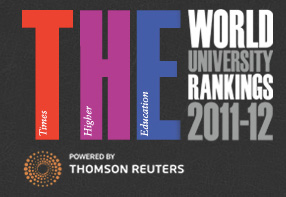 The new Times Higher Education Rankings are out. UW is ranked 25th in the world, 5th among US public institutions. (All these rankings are bogus. We report the good ones and ignore the bad ones.) Read all about it here. Read more →
The new Times Higher Education Rankings are out. UW is ranked 25th in the world, 5th among US public institutions. (All these rankings are bogus. We report the good ones and ignore the bad ones.) Read all about it here. Read more →
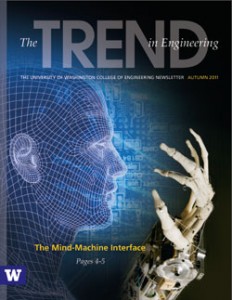 The autumn issue of Trend in Engineering – the UW College of Engineering alumni magazine – features multiple CSE stories:
The autumn issue of Trend in Engineering – the UW College of Engineering alumni magazine – features multiple CSE stories:
Read more →
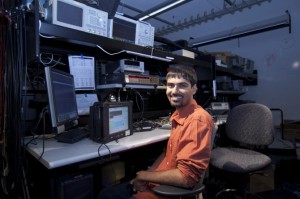 “Shwetak Patel heard the words ‘Are you alone?’ from the other end of the phone line and suddenly knew what was happening. He was about to become half a million dollars richer. A director from the MacArthur Foundation heard a thump, and Patel explained how he was on the floor, shocked that he had just received the John D. and Catherine T. MacArthur Fellowship, commonly referred to as the MacArthur Genius Award. ‘It was the typical disbelief — my students are playing the best prank ever type of stuff,’ said Patel, UW assistant professor in the departments of Computer Science & Engineering and Electrical Engineering.”
“Shwetak Patel heard the words ‘Are you alone?’ from the other end of the phone line and suddenly knew what was happening. He was about to become half a million dollars richer. A director from the MacArthur Foundation heard a thump, and Patel explained how he was on the floor, shocked that he had just received the John D. and Catherine T. MacArthur Fellowship, commonly referred to as the MacArthur Genius Award. ‘It was the typical disbelief — my students are playing the best prank ever type of stuff,’ said Patel, UW assistant professor in the departments of Computer Science & Engineering and Electrical Engineering.”
Read the article here. Read more →
 Our annual graduate student welcoming party is still referred to as “The Pit Party” – an allusion to a time 40 years ago when CSE was housed in the basement of Roberts Hall, UW’s former mining building, which included a replica open-pit coal mine. My how times have changed! Read more →
Our annual graduate student welcoming party is still referred to as “The Pit Party” – an allusion to a time 40 years ago when CSE was housed in the basement of Roberts Hall, UW’s former mining building, which included a replica open-pit coal mine. My how times have changed! Read more →
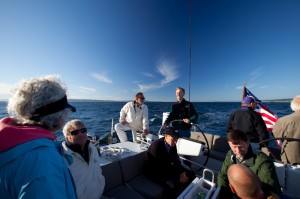 Not to be outdone by Stanford’s infamous yacht, UW CSE took to the seas on Wednesday on Tom Alberg’s spectacular 77′ sloop Cascadia. In addition to Tom and Cascadia’s master Erik Soper, the crew included UW President Michael Young, UW Dean of Engineering Matt O’Donnell, UW CSE faculty Ed Lazowska and Hank Levy, Jan Labyak (charged with keeping Ed and Hank in line), and UW CSE friends Emer Dooley, Brett Helsel, Ron Howell, Brian MacDonald, Matt McIlwain, Sujal Patel, Jack Short, and Rob Short.
Not to be outdone by Stanford’s infamous yacht, UW CSE took to the seas on Wednesday on Tom Alberg’s spectacular 77′ sloop Cascadia. In addition to Tom and Cascadia’s master Erik Soper, the crew included UW President Michael Young, UW Dean of Engineering Matt O’Donnell, UW CSE faculty Ed Lazowska and Hank Levy, Jan Labyak (charged with keeping Ed and Hank in line), and UW CSE friends Emer Dooley, Brett Helsel, Ron Howell, Brian MacDonald, Matt McIlwain, Sujal Patel, Jack Short, and Rob Short.
A million thanks to Tom – and also to Ron Howell for the terrific photographs here. Read more →
 UW CSE’s Oren Etzioni was featured today on American Public Media, along with Mike Fridgen, CEO of Oren’s latest startup Decide.com.
UW CSE’s Oren Etzioni was featured today on American Public Media, along with Mike Fridgen, CEO of Oren’s latest startup Decide.com.
“Etzioni started collecting online price data from all the airlines – then he created his own formula that could predict when the airlines would raise or lower their prices. His company was bought by Microsoft. And today, when you search for flights on Microsoft’s Bing search engine, you’ll see an arrow letting you know you if the price of that ticket is likely to head up or down.
“Now Etzioni wants to do it again. He and his partner Mike Fridgen … [are] predicting the prices of electronics – phones, cameras laptops and flat-screen TVs. When Mike came by my office, my wife and I were debating whether or not to buy a new television. … When we logged on, it showed me the lowest price available for the TV we were looking at – anywhere in the country. It showed me a price history for the product and when the next model would come out. Decide recommended we buy it – and we did.”
Check out the interview here. Try Decide.com here. Read more →
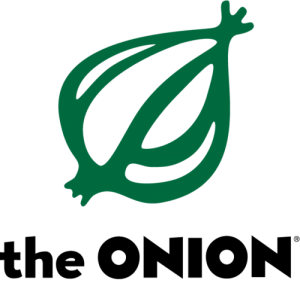 Zoran Popovic’s research continues to go where CSE has never been before – this time, The Onion. Read more →
Zoran Popovic’s research continues to go where CSE has never been before – this time, The Onion. Read more →
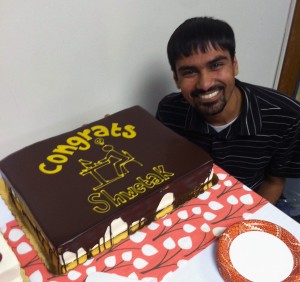 At the CSE departmental retreat today, Shwetak Patel was surprised with a mondo chocolate cake celebrating his recent MacArthur Fellowship (“Genius Award”). Once again, congratulations Shwetak! Read more →
At the CSE departmental retreat today, Shwetak Patel was surprised with a mondo chocolate cake celebrating his recent MacArthur Fellowship (“Genius Award”). Once again, congratulations Shwetak! Read more →
 A team of researchers from UW CSE, the UW Center for Communication & Civic Engagement, and Seattle CityClub has launched an improved and expanded version of the Living Voters Guide for the November 2011 election in Washington State. Its purpose is to bring together Washington voters to discuss and explore their positions on both statewide and local ballot measures for 2011. Unlike traditional voters’ guides issued by governments, advocacy groups, and other organizations, it is co-created solely by its participants. It will evolve continuously throughout the election season as Washingtonians from across the state consider the tradeoffs for each measure.
A team of researchers from UW CSE, the UW Center for Communication & Civic Engagement, and Seattle CityClub has launched an improved and expanded version of the Living Voters Guide for the November 2011 election in Washington State. Its purpose is to bring together Washington voters to discuss and explore their positions on both statewide and local ballot measures for 2011. Unlike traditional voters’ guides issued by governments, advocacy groups, and other organizations, it is co-created solely by its participants. It will evolve continuously throughout the election season as Washingtonians from across the state consider the tradeoffs for each measure.



